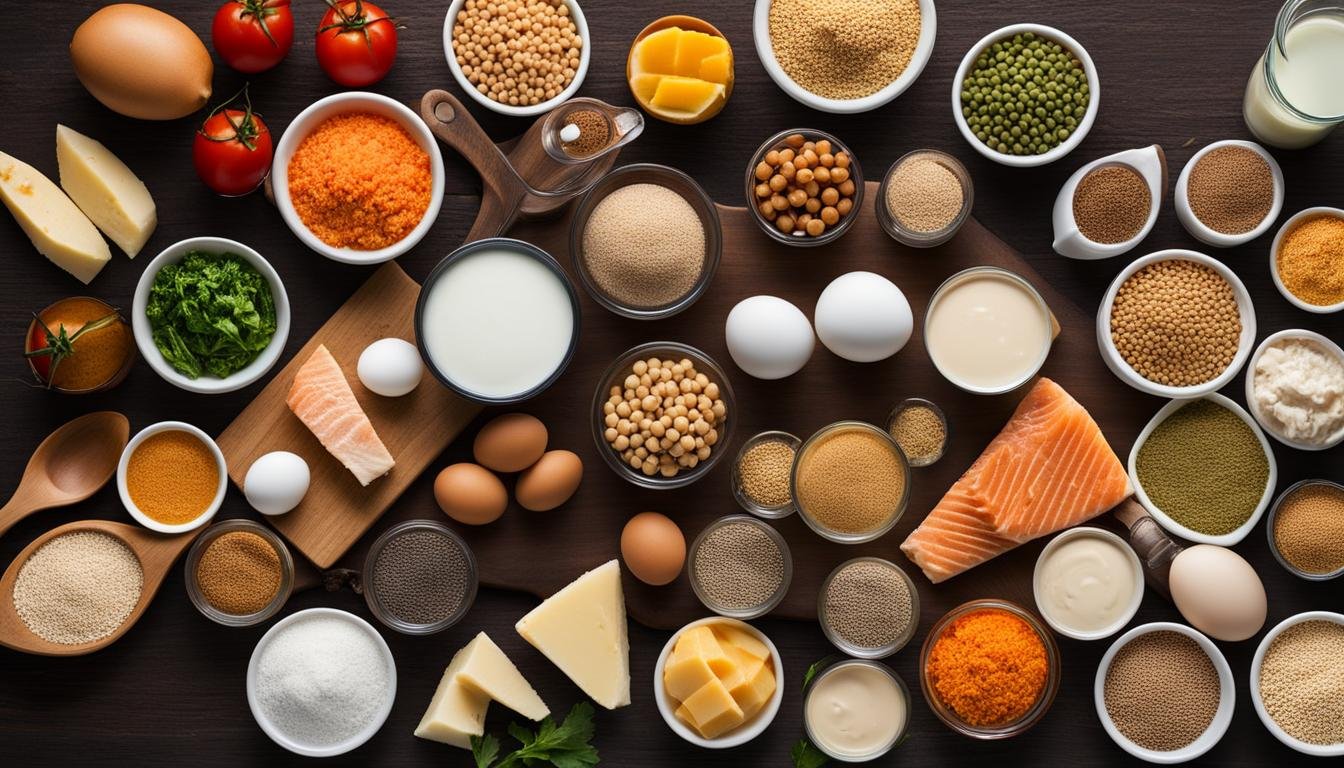Protein is more than just a buzzword in the health and fitness industry – it’s an essential nutrient that has the power to transform your body and improve your overall health. As one of the building blocks of life, protein plays a crucial role in a variety of bodily functions and processes, from muscle development to immune system support and beyond.
By incorporating adequate amounts of protein into your diet, you can experience a range of health benefits, including weight management, increased energy levels, improved brain function, and more.
So, what makes protein such a powerful nutrient? For starters, it’s a crucial component of many of the body’s tissues and structures, from muscles and organs to hair and skin. Additionally, protein plays a key role in a variety of enzymatic and hormonal processes, making it essential for optimal physical and mental performance.
But perhaps most notable is protein’s impact on muscle development. By consuming adequate amounts of protein, you can maximize your gains in the gym, improve strength and endurance, and support optimal muscle repair and growth.
The benefits of protein don’t stop there, however. This essential nutrient can also aid in weight management by promoting feelings of fullness and preserving muscle mass. It can provide long-lasting energy and support optimal brain function and mental health by aiding in the production of neurotransmitters.
Whether you’re an athlete looking to enhance performance, someone looking to manage their weight, or simply seeking to optimize your overall health, protein can be a game-changer. By ensuring you’re getting enough of this crucial nutrient in your daily diet, you can transform your health and well-being for the better.
Key Takeaways
- Protein is an essential nutrient that plays a crucial role in the body’s tissues and structures.
- Consuming adequate amounts of protein can maximize gains in the gym and support optimal muscle repair and growth.
- Protein can aid in weight management, provide long-lasting energy, and support optimal brain function and mental health.
- Incorporating high-quality sources of protein into your diet is essential for optimal health and well-being.
Understanding Protein and Its Role in the Body
Protein is a macronutrient that plays a vital role in maintaining various bodily functions. It is made up of amino acids that act as the building blocks for tissues, enzymes, and hormones in the body. Unlike carbohydrates and fats, the body does not store protein, so it must be consumed daily to meet the body’s needs.
The importance of protein in building and repairing tissues cannot be overstated. Tissues such as muscles, skin, and hair are made up of protein, and a deficiency in protein can lead to slow healing, weak muscles, and brittle hair and nails. Protein is also essential in the production of enzymes and hormones that regulate various bodily functions, including metabolism and the immune system.
Protein is involved in muscle development, repair, and growth, making it crucial for individuals who are physically active or looking to build muscle mass. Protein provides the necessary amino acids for muscle synthesis and plays a significant role in enhancing strength and performance.
The role of protein in weight management is also significant. Unlike carbohydrates and fats, protein promotes feelings of fullness and helps regulate appetite, ultimately leading to lower calorie intake and weight loss. Additionally, protein helps preserve muscle mass during weight loss, ensuring that the weight lost is mostly fat and not muscle.
Protein is also an excellent source of energy that can sustain individuals throughout the day. Protein takes longer to digest and absorb, providing a steady stream of energy rather than the quick burst provided by carbohydrates.
Finally, protein plays a crucial role in brain health and cognitive function. Amino acids in protein serve as precursors for neurotransmitters, helping regulate mood, cognition, and concentration. A deficiency in protein can lead to mental fog and poor cognitive performance.
In summary, protein is an essential nutrient that plays a vital role in numerous bodily functions. Its importance in building and repairing tissues, enhancing muscle development, weight management, energy provision, and cognitive function cannot be overstated.
Protein and Muscle Development: Unleashing Your Full Potential
Protein is a key nutrient that plays a significant role in muscle development and growth. When it comes to building muscle, protein is essential, as it provides the necessary amino acids for your muscles to repair and grow after exercise.
Research shows that consuming adequate amounts of protein can help maximize your muscle gains, enhance strength, and support optimal muscle repair and growth. A study published in the American Journal of Clinical Nutrition found that consuming a high-protein diet can lead to significant increases in muscle mass and strength.
One way protein helps with muscle development is through its impact on muscle protein synthesis. This process involves the creation of new muscle proteins to replace the damaged ones caused by resistance exercise. Consuming protein after a workout can help stimulate muscle protein synthesis and promote muscle growth.
It’s important to note that consuming protein alone won’t necessarily lead to muscle growth. Resistance exercise is also necessary to stimulate muscle protein synthesis and maximize muscle gains. A combination of adequate protein intake and regular resistance exercise is key to unlocking your full potential for muscle development.
Beyond Muscle Development: Other Potential Benefits of Protein
While protein is crucial for muscle development, it also offers a host of other potential health benefits. For example, a high-protein diet may aid in weight loss by promoting feelings of fullness and reducing overall calorie intake.
Additionally, protein can be a valuable source of long-lasting energy, surpassing the quick but fleeting energy provided by carbohydrates. It can also help support optimal brain function and mental health by aiding in the production of neurotransmitters.
| Type of Protein | Protein Content Per 3-ounce (85-gram) Serving |
|---|---|
| Chicken Breast | 27 grams |
| Salmon | 22 grams |
| Greek Yogurt | 17 grams |
| Black Beans | 15 grams |
There are numerous sources of protein, both animal and plant-based, that can provide all the essential amino acids your body needs for optimal health. Incorporating these sources into your diet, along with regular resistance exercise, can help you unleash your full potential for muscle development and overall health.

The Benefits of Protein for Weight Management
Protein is often hailed as a critical nutrient for weight loss and weight maintenance. Consuming sufficient amounts of protein can bring about numerous benefits, ultimately aiding in weight management.
One way protein can promote weight loss is by increasing feelings of fullness. Studies have shown that protein is the most satiating nutrient, meaning it can keep you feeling fuller for longer periods. This effect can lead to a reduction in calorie intake and ultimately contribute to weight loss.
Additionally, protein has been found to increase calorie burning, leading to a boost in metabolism. This increase in metabolic rate can help burn more calories, even at rest.
Moreover, preserving muscle mass is crucial for weight loss, as muscle plays a vital role in burning calories and regulating metabolism. Consuming adequate amounts of protein can help preserve muscle mass and even support muscle growth.
Overall, incorporating protein into your diet can aid in weight loss and maintenance by promoting feelings of fullness, increasing calorie burning, and preserving muscle mass. Consider adding high-quality sources of protein to every meal to reap these benefits.
Protein and Energy Levels: Fueling Your Body’s Powerhouse
Protein is a vital nutrient that can significantly impact your energy levels, fueling your body’s powerhouse and keeping you going throughout the day. While carbohydrates are a quick source of energy, protein offers a more sustained release, helping you avoid the crash and burn that often follows a carb-heavy meal.
One study showed that consuming a high-protein breakfast can lead to increased feelings of fullness and satiety, reduce cravings, and even aid in weight loss. Additionally, protein can help preserve and build lean muscle mass, contributing to greater endurance and strength during physical activity.
| Protein Source | Grams of Protein per 100 grams |
|---|---|
| Chicken breast | 31 grams |
| Greek yogurt | 10 grams |
| Almonds | 21 grams |
| Lentils | 9 grams |
When it comes to fueling your body with protein, it’s essential to choose high-quality sources that offer a complete amino acid profile. Animal-based options such as chicken, fish, and eggs are excellent choices, but plant-based sources like lentils, nuts, and seeds can provide just as much protein with added fiber and other essential nutrients.
Next time you need a boost of energy, reach for a protein-rich snack like Greek yogurt or almonds instead of a sugary treat. Your body will thank you for the sustained and long-lasting fuel.

Protein for Optimal Brain Function and Mental Health
Protein is a crucial nutrient that plays a significant role in brain health and cognitive function. The brain is composed mainly of fat and protein, and consuming adequate amounts of protein can support the production of neurotransmitters, which are essential for communication between brain cells.
In addition, protein can enhance focus and concentration, making it easier to stay alert and on-task. Research has also shown that protein can help regulate mood and improve mental well-being, making it an essential nutrient for overall mental health.
The Role of Amino Acids in Brain Function
Protein is made up of amino acids, which are essential for brain function. Amino acids are the building blocks of neurotransmitters, which are responsible for carrying signals between brain cells. These neurotransmitters play a crucial role in regulating mood and emotions, controlling movement, and aiding memory and learning.
Some amino acids, such as tryptophan and tyrosine, are precursors to neurotransmitters like serotonin and dopamine. These neurotransmitters are essential for regulating mood, pleasure, and reward, and are often targeted by antidepressant and antianxiety medications.
Protein and Cognitive Function
Research has shown that protein can enhance cognitive function, particularly in older adults. A study published in the American Journal of Clinical Nutrition found that older adults who consumed higher amounts of protein had better cognitive performance than those who consumed lower amounts.
In addition, a study published in The Journal of Nutrition found that consuming a high-protein breakfast can improve cognitive function in the short-term, particularly memory and attention.
How Much Protein Do You Need?
The recommended daily intake of protein varies based on age, sex, and activity level. The average sedentary adult should aim for 0.8 grams of protein per kilogram of body weight per day. However, those who are more active may require higher amounts of protein to support muscle repair and growth.
It’s also important to note that not all proteins are created equal. Animal proteins, such as meat, poultry, and dairy, are considered high-quality proteins because they contain all the essential amino acids our bodies need. Plant-based proteins, such as beans, nuts, and seeds, can be excellent sources of protein but may require combining different protein sources to ensure adequate intake of all essential amino acids.
“Protein is a crucial nutrient that plays a significant role in brain health and cognitive function.”
In conclusion, consuming adequate amounts of protein is essential for optimal brain function and mental health. Whether you’re looking to improve cognitive performance, regulate mood, or enhance focus and concentration, protein can be a valuable tool in achieving these goals.
Protein and Immune System Support: Strengthening Your Defenses
Protein plays a vital role in supporting the immune system, the body’s defense mechanism against infections, diseases, and illnesses. Adequate protein intake helps build, repair, and maintain various cells and tissues that make up the immune system.
The immune system comprises many different types of cells that work together to recognize, attack, and destroy invaders like harmful bacteria, viruses, and cancer cells. These immune cells require a constant supply of protein to function optimally and multiply when necessary.
How Protein Supports the Immune System
Protein is a building block for various immune cells like antibodies, cytokines, and T-cells that are crucial for fighting off infections and diseases. A deficiency in protein can lead to weakened immune function and increased susceptibility to infections.
| Protein Source | Amount per serving | % Daily Value* |
|---|---|---|
| Grilled chicken breast | 26 grams | 52% |
| Canned tuna | 22 grams | 44% |
| Almonds | 6 grams | 12% |
| Quinoa | 8 grams | 16% |
*Based on a 2,000 calorie diet
Some proteins have specific immune functions, like lactoferrin, found in milk, which helps inhibit the growth of bacteria and viruses in the body. Soy protein is also shown to have immune-enhancing properties that can help improve the body’s defense mechanisms.
Conclusion
Incorporating protein-rich foods into your diet is essential to support optimal immune function and keep your body’s defenses strong. With a variety of animal and plant-based protein sources to choose from, there’s no excuse not to fuel your body with this crucial nutrient.
The Best Sources of Protein: Fueling Your Body Right
When it comes to incorporating protein into your diet, choosing the right sources is crucial. Different foods offer varying amounts and types of protein, and some may be more beneficial for your body than others. Here are some of the best sources of protein to fuel your body right:
| Animal-Based Sources | Plant-Based Sources |
|---|---|
| Chicken breast | Chickpeas |
| Salmon | Lentils |
| Eggs | Quinoa |
| Greek yogurt | Tempeh |
| Cottage cheese | Seitan |
Note: These options are all high-quality sources of protein, offering all essential amino acids to support optimal health.
Incorporating these protein sources into your meals and snacks can help you feel fuller for longer and provide your body with the nutrients it needs to function at its best. It’s essential to consider your dietary needs and preferences when selecting protein sources, as some people may opt for animal-based sources over plant-based, and vice versa.
Another critical factor to consider is the quality of the protein sources. For example, animal-based sources of protein such as chicken or salmon are often high in protein and contain essential nutrients, making them a great choice for many. At the same time, plant-based sources like lentils or chickpeas also provide essential nutrients and can offer additional benefits like fiber.
Ultimately, incorporating a variety of protein sources into your diet is key to fueling your body right and achieving optimal health. Whether you prefer animal-based or plant-based sources, there are plenty of options to choose from that can provide all the protein your body needs to thrive.
Conclusion
As we’ve explored in this article, protein is a powerful nutrient that can transform your health in numerous ways. By understanding its role in the body and incorporating high-quality sources into your diet, you can unlock its full potential and reap the benefits for years to come.
From supporting muscle development and weight management to fueling your energy levels and brain function, protein truly is an essential building block for optimal health and well-being.
So whether you choose animal-based options like lean meats, poultry, and fish or plant-based options like beans, nuts, and seeds, make sure to prioritize protein in your diet. By doing so, you’ll be giving your body the nourishment it needs to thrive.
FAQ
What is the role of protein in the body?
Protein plays a vital role in building and repairing tissues, supporting immune function, and acting as an essential building block for enzymes and hormones.
How does protein contribute to muscle development?
Consuming adequate amounts of protein can maximize gains, enhance strength, and support optimal muscle repair and growth.
What are the benefits of protein for weight management?
Protein promotes feelings of fullness, increases calorie burning, and preserves muscle mass, aiding in weight loss and maintenance.
How can protein fuel your body’s energy levels?
Protein provides long-lasting energy, surpassing quick but fleeting energy provided by carbohydrates, and enhances athletic performance.
What impact does protein have on brain function and mental health?
Protein supports the production of neurotransmitters, enhances focus and concentration, and plays a role in mood regulation and mental well-being.
How does protein support the immune system?
Protein aids in the production of immune cells and antibodies, reinforces the body’s defense mechanisms, and helps fend off infections and illnesses.
What are the best sources of protein?
High-quality sources of protein include animal and plant-based options, which provide all the essential amino acids necessary for optimal health.























